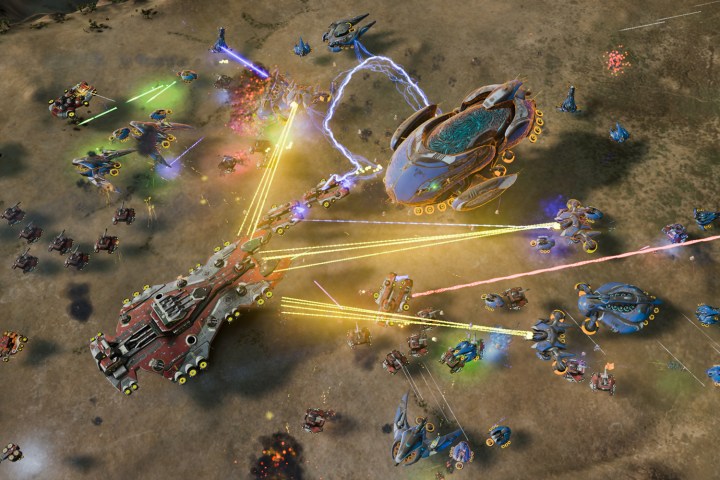
Although AMD’s Ryzen processors have been impressive, especially in multithreaded tasks, the one area they fell down a little compared to Intel, was in gaming. We were told, though, that with optimizations, that could change. Although some speculated that that was wishful thinking on the part of AMD, early reports following the Ashes of Singularity optimization seem to suggest otherwise.
This update to the game comes as part of the v2.11.x build, which will hit Steam on Thursday for all owners and saw big improvements in a variety of tests. Using the high-graphical preset and a 1080p resolution, an average of batch results saw framerates go from an average of 64 to 84 frames per second.
This was based on a test system fitted with an AMD Ryzen 7 1800X CPU, 16GB of 2,933MHz DDR4 and an Nvidia GTX 1080 graphics card running on Windows 10.
To make sure that these results were driven by improvements in the way the CPU handles information, AMD also conducted a CPU focused benchmark within Ashes of the Singularity, which looks to de-emphasise the graphics card. In that test, framerates improved from an average of 34.7 to 39.6.
As part of this release, AMD also highlighted some changes to DOTA 2, which Valve implemented in the March 20 update. Those tweaks were tested in conjunction with the Evil Geniuses pro team and found that the AMD Ryzen test system was able of delivering 91 FPS on average after the change, compared with 79 FPS before.
Alongside these gaming optimizations, AMD has also made some changes to the AMD Generic Encapsulated Software Architecture (AGESA) system that works alongside the system’s BIOS for booting. These have meant a reduction in DRAM latency by six nanoseconds, which should improve performance in latency-sensitive scenarios. It’s also fixed the overclock sleep bug which was causing problems for some users and fixed another system hang issue.
While we would urge caution when it comes to accepting benchmarks conducted by the hardware manufacturer itself at face value, Toms Hardware has jumped at the chance to conduct its own testing and found similar results. Also of note is that the Ashes update also leads to small performance gains for Intel hardware too.
Creative Assembly is one developer which also announced the intention to optimize its engine for Ryzen, so it will be interesting to see what can come of that and whether it will encourage other developers to do the same.
Editors' Recommendations
- Gigabyte just confirmed AMD’s Ryzen 9000 CPUs
- AMD still hasn’t made the big APU dream a reality
- Gigabyte may have just leaked AMD next big release
- AMD’s latest V-Cache chip proves to be cheap, fast, and perfect for gaming
- AMD’s upcoming Ryzen 5 5600X3D could completely dethrone Intel in budget builds





